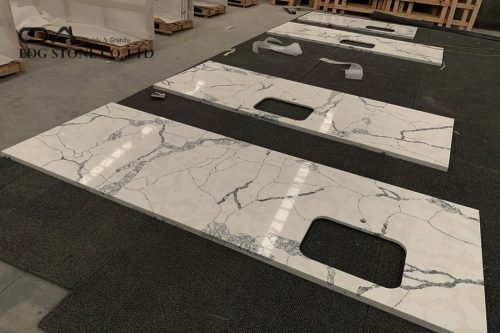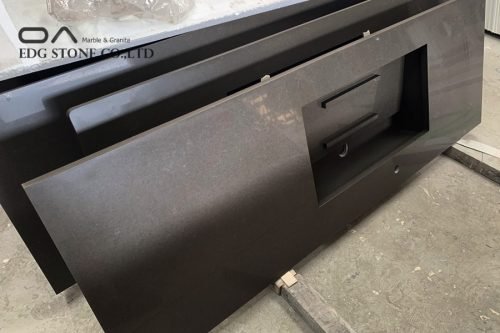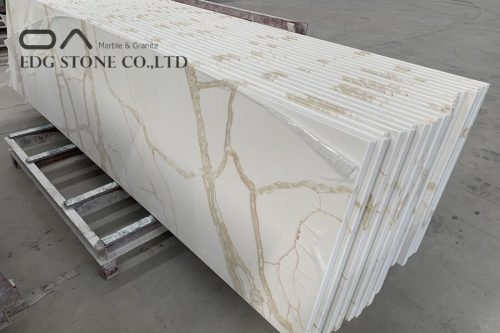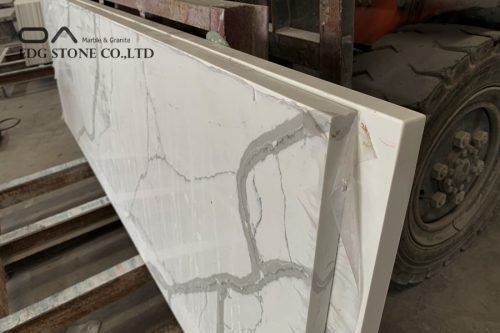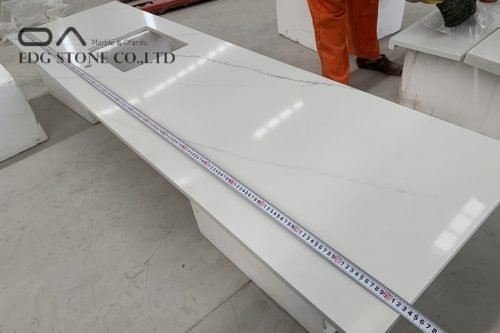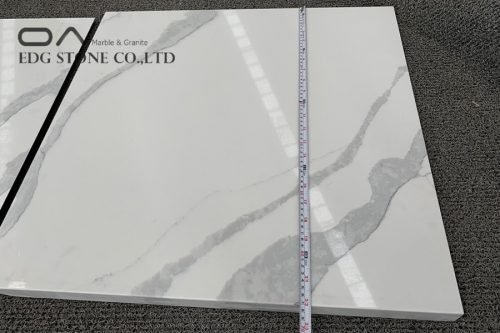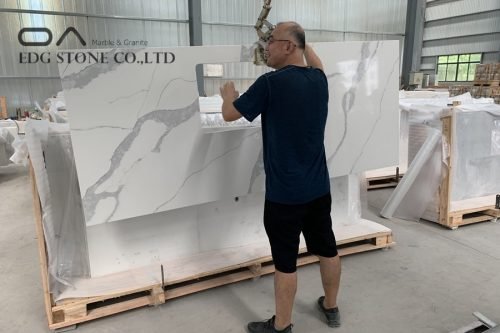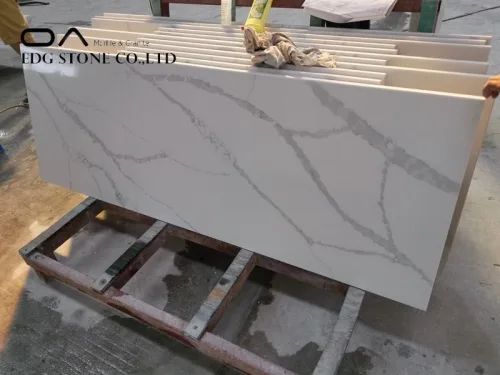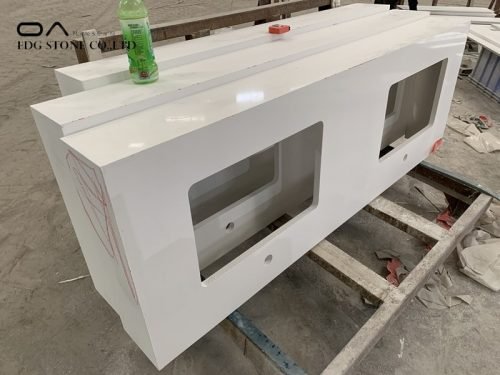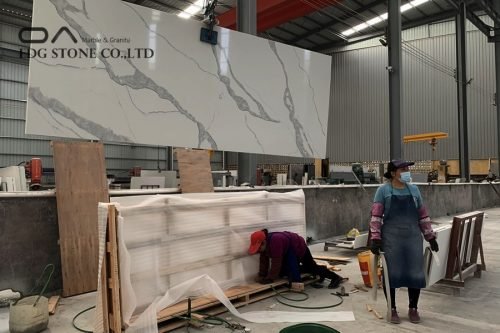 The Blanca arabescato quartz kitchen made of engineered quartz (not to be confused with Quartzite, another appealing natural stone used as counters) is a manmade product created mostly from natural materials. It’s made of 90% to 94% ground quartz and 6% to 10% resins and pigments that are combined into durable and nonporous slabs. The strength of quartz, even in a manufactured form, makes it naturally resistant to abrasion, scratches, dents, and even acids without the need for sealants. And the environmental impact of manufactured quartz is low: Quartz is an abundant material and the finished product is nontoxic and nonallergenic and will last a lifetime, reducing the need for replacement.
The Blanca arabescato quartz kitchen made of engineered quartz (not to be confused with Quartzite, another appealing natural stone used as counters) is a manmade product created mostly from natural materials. It’s made of 90% to 94% ground quartz and 6% to 10% resins and pigments that are combined into durable and nonporous slabs. The strength of quartz, even in a manufactured form, makes it naturally resistant to abrasion, scratches, dents, and even acids without the need for sealants. And the environmental impact of manufactured quartz is low: Quartz is an abundant material and the finished product is nontoxic and nonallergenic and will last a lifetime, reducing the need for replacement.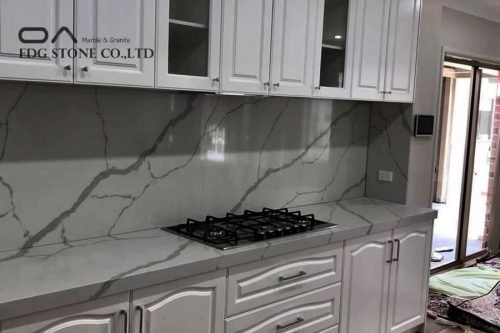
 The blue and white quartz countertops made of engineered quartz (not to be confused with Quartzite, another appealing natural stone used as counters) is a manmade product created mostly from natural materials. It’s made of 90% to 94% ground quartz and 6% to 10% resins and pigments that are combined into durable and nonporous slabs. The strength of quartz, even in a manufactured form, makes it naturally resistant to abrasion, scratches, dents, and even acids without the need for sealants. And the environmental impact of manufactured quartz is low: Quartz is an abundant material and the finished product is nontoxic and nonallergenic and will last a lifetime, reducing the need for replacement.
The blue and white quartz countertops made of engineered quartz (not to be confused with Quartzite, another appealing natural stone used as counters) is a manmade product created mostly from natural materials. It’s made of 90% to 94% ground quartz and 6% to 10% resins and pigments that are combined into durable and nonporous slabs. The strength of quartz, even in a manufactured form, makes it naturally resistant to abrasion, scratches, dents, and even acids without the need for sealants. And the environmental impact of manufactured quartz is low: Quartz is an abundant material and the finished product is nontoxic and nonallergenic and will last a lifetime, reducing the need for replacement. The brown quartz countertops made of engineered quartz (not to be confused with Quartzite, another appealing natural stone used as counters) is a manmade product created mostly from natural materials. It’s made of 90% to 94% ground quartz and 6% to 10% resins and pigments that are combined into durable and nonporous slabs. The strength of quartz, even in a manufactured form, makes it naturally resistant to abrasion, scratches, dents, and even acids without the need for sealants. And the environmental impact of manufactured quartz is low: Quartz is an abundant material and the finished product is nontoxic and nonallergenic and will last a lifetime, reducing the need for replacement.
The brown quartz countertops made of engineered quartz (not to be confused with Quartzite, another appealing natural stone used as counters) is a manmade product created mostly from natural materials. It’s made of 90% to 94% ground quartz and 6% to 10% resins and pigments that are combined into durable and nonporous slabs. The strength of quartz, even in a manufactured form, makes it naturally resistant to abrasion, scratches, dents, and even acids without the need for sealants. And the environmental impact of manufactured quartz is low: Quartz is an abundant material and the finished product is nontoxic and nonallergenic and will last a lifetime, reducing the need for replacement.
 The bullnose quartz countertops made of engineered quartz (not to be confused with Quartzite, another appealing natural stone used as counters) is a manmade product created mostly from natural materials. It’s made of 90% to 94% ground quartz and 6% to 10% resins and pigments that are combined into durable and nonporous slabs. The strength of quartz, even in a manufactured form, makes it naturally resistant to abrasion, scratches, dents, and even acids without the need for sealants. And the environmental impact of manufactured quartz is low: Quartz is an abundant material and the finished product is nontoxic and nonallergenic and will last a lifetime, reducing the need for replacement.
The bullnose quartz countertops made of engineered quartz (not to be confused with Quartzite, another appealing natural stone used as counters) is a manmade product created mostly from natural materials. It’s made of 90% to 94% ground quartz and 6% to 10% resins and pigments that are combined into durable and nonporous slabs. The strength of quartz, even in a manufactured form, makes it naturally resistant to abrasion, scratches, dents, and even acids without the need for sealants. And the environmental impact of manufactured quartz is low: Quartz is an abundant material and the finished product is nontoxic and nonallergenic and will last a lifetime, reducing the need for replacement.
 The burnt quartz countertop made of engineered quartz (not to be confused with Quartzite, another appealing natural stone used as counters) is a manmade product created mostly from natural materials. It’s made of 90% to 94% ground quartz and 6% to 10% resins and pigments that are combined into durable and nonporous slabs. The strength of quartz, even in a manufactured form, makes it naturally resistant to abrasion, scratches, dents, and even acids without the need for sealants. And the environmental impact of manufactured quartz is low: Quartz is an abundant material and the finished product is nontoxic and nonallergenic and will last a lifetime, reducing the need for replacement.
The burnt quartz countertop made of engineered quartz (not to be confused with Quartzite, another appealing natural stone used as counters) is a manmade product created mostly from natural materials. It’s made of 90% to 94% ground quartz and 6% to 10% resins and pigments that are combined into durable and nonporous slabs. The strength of quartz, even in a manufactured form, makes it naturally resistant to abrasion, scratches, dents, and even acids without the need for sealants. And the environmental impact of manufactured quartz is low: Quartz is an abundant material and the finished product is nontoxic and nonallergenic and will last a lifetime, reducing the need for replacement. The Calacatta botanica quartz kitchen made of engineered quartz (not to be confused with Quartzite, another appealing natural stone used as counters) is a manmade product created mostly from natural materials. It’s made of 90% to 94% ground quartz and 6% to 10% resins and pigments that are combined into durable and nonporous slabs. The strength of quartz, even in a manufactured form, makes it naturally resistant to abrasion, scratches, dents, and even acids without the need for sealants. And the environmental impact of manufactured quartz is low: Quartz is an abundant material and the finished product is nontoxic and nonallergenic and will last a lifetime, reducing the need for replacement.
The Calacatta botanica quartz kitchen made of engineered quartz (not to be confused with Quartzite, another appealing natural stone used as counters) is a manmade product created mostly from natural materials. It’s made of 90% to 94% ground quartz and 6% to 10% resins and pigments that are combined into durable and nonporous slabs. The strength of quartz, even in a manufactured form, makes it naturally resistant to abrasion, scratches, dents, and even acids without the need for sealants. And the environmental impact of manufactured quartz is low: Quartz is an abundant material and the finished product is nontoxic and nonallergenic and will last a lifetime, reducing the need for replacement. The Calacatta classique quartz kitchen made of engineered quartz (not to be confused with Quartzite, another appealing natural stone used as counters) is a manmade product created mostly from natural materials. It’s made of 90% to 94% ground quartz and 6% to 10% resins and pigments that are combined into durable and nonporous slabs. The strength of quartz, even in a manufactured form, makes it naturally resistant to abrasion, scratches, dents, and even acids without the need for sealants. And the environmental impact of manufactured quartz is low: Quartz is an abundant material and the finished product is nontoxic and nonallergenic and will last a lifetime, reducing the need for replacement.
The Calacatta classique quartz kitchen made of engineered quartz (not to be confused with Quartzite, another appealing natural stone used as counters) is a manmade product created mostly from natural materials. It’s made of 90% to 94% ground quartz and 6% to 10% resins and pigments that are combined into durable and nonporous slabs. The strength of quartz, even in a manufactured form, makes it naturally resistant to abrasion, scratches, dents, and even acids without the need for sealants. And the environmental impact of manufactured quartz is low: Quartz is an abundant material and the finished product is nontoxic and nonallergenic and will last a lifetime, reducing the need for replacement.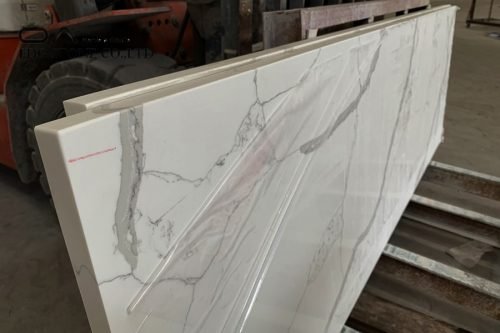
 The calacatta gold quartz countertops made of engineered quartz (not to be confused with Quartzite, another appealing natural stone used as counters) is a manmade product created mostly from natural materials. It’s made of 90% to 94% ground quartz and 6% to 10% resins and pigments that are combined into durable and nonporous slabs. The strength of quartz, even in a manufactured form, makes it naturally resistant to abrasion, scratches, dents, and even acids without the need for sealants. And the environmental impact of manufactured quartz is low: Quartz is an abundant material and the finished product is nontoxic and nonallergenic and will last a lifetime, reducing the need for replacement.
The calacatta gold quartz countertops made of engineered quartz (not to be confused with Quartzite, another appealing natural stone used as counters) is a manmade product created mostly from natural materials. It’s made of 90% to 94% ground quartz and 6% to 10% resins and pigments that are combined into durable and nonporous slabs. The strength of quartz, even in a manufactured form, makes it naturally resistant to abrasion, scratches, dents, and even acids without the need for sealants. And the environmental impact of manufactured quartz is low: Quartz is an abundant material and the finished product is nontoxic and nonallergenic and will last a lifetime, reducing the need for replacement. The calacatta laza quartz countertops made of engineered quartz (not to be confused with Quartzite, another appealing natural stone used as counters) is a manmade product created mostly from natural materials. It’s made of 90% to 94% ground quartz and 6% to 10% resins and pigments that are combined into durable and nonporous slabs. The strength of quartz, even in a manufactured form, makes it naturally resistant to abrasion, scratches, dents, and even acids without the need for sealants. And the environmental impact of manufactured quartz is low: Quartz is an abundant material and the finished product is nontoxic and nonallergenic and will last a lifetime, reducing the need for replacement.
The calacatta laza quartz countertops made of engineered quartz (not to be confused with Quartzite, another appealing natural stone used as counters) is a manmade product created mostly from natural materials. It’s made of 90% to 94% ground quartz and 6% to 10% resins and pigments that are combined into durable and nonporous slabs. The strength of quartz, even in a manufactured form, makes it naturally resistant to abrasion, scratches, dents, and even acids without the need for sealants. And the environmental impact of manufactured quartz is low: Quartz is an abundant material and the finished product is nontoxic and nonallergenic and will last a lifetime, reducing the need for replacement. The Calacatta laza quartz kitchen made of engineered quartz (not to be confused with Quartzite, another appealing natural stone used as counters) is a manmade product created mostly from natural materials. It’s made of 90% to 94% ground quartz and 6% to 10% resins and pigments that are combined into durable and nonporous slabs. The strength of quartz, even in a manufactured form, makes it naturally resistant to abrasion, scratches, dents, and even acids without the need for sealants. And the environmental impact of manufactured quartz is low: Quartz is an abundant material and the finished product is nontoxic and nonallergenic and will last a lifetime, reducing the need for replacement.
The Calacatta laza quartz kitchen made of engineered quartz (not to be confused with Quartzite, another appealing natural stone used as counters) is a manmade product created mostly from natural materials. It’s made of 90% to 94% ground quartz and 6% to 10% resins and pigments that are combined into durable and nonporous slabs. The strength of quartz, even in a manufactured form, makes it naturally resistant to abrasion, scratches, dents, and even acids without the need for sealants. And the environmental impact of manufactured quartz is low: Quartz is an abundant material and the finished product is nontoxic and nonallergenic and will last a lifetime, reducing the need for replacement. The Calacatta luccia quartz kitchen made of engineered quartz (not to be confused with Quartzite, another appealing natural stone used as counters) is a manmade product created mostly from natural materials. It’s made of 90% to 94% ground quartz and 6% to 10% resins and pigments that are combined into durable and nonporous slabs. The strength of quartz, even in a manufactured form, makes it naturally resistant to abrasion, scratches, dents, and even acids without the need for sealants. And the environmental impact of manufactured quartz is low: Quartz is an abundant material and the finished product is nontoxic and nonallergenic and will last a lifetime, reducing the need for replacement.
The Calacatta luccia quartz kitchen made of engineered quartz (not to be confused with Quartzite, another appealing natural stone used as counters) is a manmade product created mostly from natural materials. It’s made of 90% to 94% ground quartz and 6% to 10% resins and pigments that are combined into durable and nonporous slabs. The strength of quartz, even in a manufactured form, makes it naturally resistant to abrasion, scratches, dents, and even acids without the need for sealants. And the environmental impact of manufactured quartz is low: Quartz is an abundant material and the finished product is nontoxic and nonallergenic and will last a lifetime, reducing the need for replacement. The Calacatta lusso quartz kitchen made of engineered quartz (not to be confused with Quartzite, another appealing natural stone used as counters) is a manmade product created mostly from natural materials. It’s made of 90% to 94% ground quartz and 6% to 10% resins and pigments that are combined into durable and nonporous slabs. The strength of quartz, even in a manufactured form, makes it naturally resistant to abrasion, scratches, dents, and even acids without the need for sealants. And the environmental impact of manufactured quartz is low: Quartz is an abundant material and the finished product is nontoxic and nonallergenic and will last a lifetime, reducing the need for replacement.
The Calacatta lusso quartz kitchen made of engineered quartz (not to be confused with Quartzite, another appealing natural stone used as counters) is a manmade product created mostly from natural materials. It’s made of 90% to 94% ground quartz and 6% to 10% resins and pigments that are combined into durable and nonporous slabs. The strength of quartz, even in a manufactured form, makes it naturally resistant to abrasion, scratches, dents, and even acids without the need for sealants. And the environmental impact of manufactured quartz is low: Quartz is an abundant material and the finished product is nontoxic and nonallergenic and will last a lifetime, reducing the need for replacement. The Calacatta pietra quartz kitchen made of engineered quartz (not to be confused with Quartzite, another appealing natural stone used as counters) is a manmade product created mostly from natural materials. It’s made of 90% to 94% ground quartz and 6% to 10% resins and pigments that are combined into durable and nonporous slabs. The strength of quartz, even in a manufactured form, makes it naturally resistant to abrasion, scratches, dents, and even acids without the need for sealants. And the environmental impact of manufactured quartz is low: Quartz is an abundant material and the finished product is nontoxic and nonallergenic and will last a lifetime, reducing the need for replacement.
The Calacatta pietra quartz kitchen made of engineered quartz (not to be confused with Quartzite, another appealing natural stone used as counters) is a manmade product created mostly from natural materials. It’s made of 90% to 94% ground quartz and 6% to 10% resins and pigments that are combined into durable and nonporous slabs. The strength of quartz, even in a manufactured form, makes it naturally resistant to abrasion, scratches, dents, and even acids without the need for sealants. And the environmental impact of manufactured quartz is low: Quartz is an abundant material and the finished product is nontoxic and nonallergenic and will last a lifetime, reducing the need for replacement. The Calacatta quartz kitchen island tops made of engineered quartz (not to be confused with Quartzite, another appealing natural stone used as counters) is a manmade product created mostly from natural materials. It’s made of 90% to 94% ground quartz and 6% to 10% resins and pigments that are combined into durable and nonporous slabs. The strength of quartz, even in a manufactured form, makes it naturally resistant to abrasion, scratches, dents, and even acids without the need for sealants. And the environmental impact of manufactured quartz is low: Quartz is an abundant material and the finished product is nontoxic and nonallergenic and will last a lifetime, reducing the need for replacement.
The Calacatta quartz kitchen island tops made of engineered quartz (not to be confused with Quartzite, another appealing natural stone used as counters) is a manmade product created mostly from natural materials. It’s made of 90% to 94% ground quartz and 6% to 10% resins and pigments that are combined into durable and nonporous slabs. The strength of quartz, even in a manufactured form, makes it naturally resistant to abrasion, scratches, dents, and even acids without the need for sealants. And the environmental impact of manufactured quartz is low: Quartz is an abundant material and the finished product is nontoxic and nonallergenic and will last a lifetime, reducing the need for replacement. The Calacatta quartz stone for kitchen made of engineered quartz (not to be confused with Quartzite, another appealing natural stone used as counters) is a manmade product created mostly from natural materials. It’s made of 90% to 94% ground quartz and 6% to 10% resins and pigments that are combined into durable and nonporous slabs. The strength of quartz, even in a manufactured form, makes it naturally resistant to abrasion, scratches, dents, and even acids without the need for sealants. And the environmental impact of manufactured quartz is low: Quartz is an abundant material and the finished product is nontoxic and nonallergenic and will last a lifetime, reducing the need for replacement.
The Calacatta quartz stone for kitchen made of engineered quartz (not to be confused with Quartzite, another appealing natural stone used as counters) is a manmade product created mostly from natural materials. It’s made of 90% to 94% ground quartz and 6% to 10% resins and pigments that are combined into durable and nonporous slabs. The strength of quartz, even in a manufactured form, makes it naturally resistant to abrasion, scratches, dents, and even acids without the need for sealants. And the environmental impact of manufactured quartz is low: Quartz is an abundant material and the finished product is nontoxic and nonallergenic and will last a lifetime, reducing the need for replacement. The Calacatta quartz stone for kitchen countertops made of engineered quartz (not to be confused with Quartzite, another appealing natural stone used as counters) is a manmade product created mostly from natural materials. It’s made of 90% to 94% ground quartz and 6% to 10% resins and pigments that are combined into durable and nonporous slabs. The strength of quartz, even in a manufactured form, makes it naturally resistant to abrasion, scratches, dents, and even acids without the need for sealants. And the environmental impact of manufactured quartz is low: Quartz is an abundant material and the finished product is nontoxic and nonallergenic and will last a lifetime, reducing the need for replacement.
The Calacatta quartz stone for kitchen countertops made of engineered quartz (not to be confused with Quartzite, another appealing natural stone used as counters) is a manmade product created mostly from natural materials. It’s made of 90% to 94% ground quartz and 6% to 10% resins and pigments that are combined into durable and nonporous slabs. The strength of quartz, even in a manufactured form, makes it naturally resistant to abrasion, scratches, dents, and even acids without the need for sealants. And the environmental impact of manufactured quartz is low: Quartz is an abundant material and the finished product is nontoxic and nonallergenic and will last a lifetime, reducing the need for replacement. The Calacatta quartz waterfall kitchen island made of engineered quartz (not to be confused with Quartzite, another appealing natural stone used as counters) is a manmade product created mostly from natural materials. It’s made of 90% to 94% ground quartz and 6% to 10% resins and pigments that are combined into durable and nonporous slabs. The strength of quartz, even in a manufactured form, makes it naturally resistant to abrasion, scratches, dents, and even acids without the need for sealants. And the environmental impact of manufactured quartz is low: Quartz is an abundant material and the finished product is nontoxic and nonallergenic and will last a lifetime, reducing the need for replacement.
The Calacatta quartz waterfall kitchen island made of engineered quartz (not to be confused with Quartzite, another appealing natural stone used as counters) is a manmade product created mostly from natural materials. It’s made of 90% to 94% ground quartz and 6% to 10% resins and pigments that are combined into durable and nonporous slabs. The strength of quartz, even in a manufactured form, makes it naturally resistant to abrasion, scratches, dents, and even acids without the need for sealants. And the environmental impact of manufactured quartz is low: Quartz is an abundant material and the finished product is nontoxic and nonallergenic and will last a lifetime, reducing the need for replacement. The Calacatta quartzite kitchen countertops made of engineered quartz (not to be confused with Quartzite, another appealing natural stone used as counters) is a manmade product created mostly from natural materials. It’s made of 90% to 94% ground quartz and 6% to 10% resins and pigments that are combined into durable and nonporous slabs. The strength of quartz, even in a manufactured form, makes it naturally resistant to abrasion, scratches, dents, and even acids without the need for sealants. And the environmental impact of manufactured quartz is low: Quartz is an abundant material and the finished product is nontoxic and nonallergenic and will last a lifetime, reducing the need for replacement.
The Calacatta quartzite kitchen countertops made of engineered quartz (not to be confused with Quartzite, another appealing natural stone used as counters) is a manmade product created mostly from natural materials. It’s made of 90% to 94% ground quartz and 6% to 10% resins and pigments that are combined into durable and nonporous slabs. The strength of quartz, even in a manufactured form, makes it naturally resistant to abrasion, scratches, dents, and even acids without the need for sealants. And the environmental impact of manufactured quartz is low: Quartz is an abundant material and the finished product is nontoxic and nonallergenic and will last a lifetime, reducing the need for replacement. The Calacatta rococo quartz kitchen made of engineered quartz (not to be confused with Quartzite, another appealing natural stone used as counters) is a manmade product created mostly from natural materials. It’s made of 90% to 94% ground quartz and 6% to 10% resins and pigments that are combined into durable and nonporous slabs. The strength of quartz, even in a manufactured form, makes it naturally resistant to abrasion, scratches, dents, and even acids without the need for sealants. And the environmental impact of manufactured quartz is low: Quartz is an abundant material and the finished product is nontoxic and nonallergenic and will last a lifetime, reducing the need for replacement.
The Calacatta rococo quartz kitchen made of engineered quartz (not to be confused with Quartzite, another appealing natural stone used as counters) is a manmade product created mostly from natural materials. It’s made of 90% to 94% ground quartz and 6% to 10% resins and pigments that are combined into durable and nonporous slabs. The strength of quartz, even in a manufactured form, makes it naturally resistant to abrasion, scratches, dents, and even acids without the need for sealants. And the environmental impact of manufactured quartz is low: Quartz is an abundant material and the finished product is nontoxic and nonallergenic and will last a lifetime, reducing the need for replacement. The Calacatta verona quartz kitchen made of engineered quartz (not to be confused with Quartzite, another appealing natural stone used as counters) is a manmade product created mostly from natural materials. It’s made of 90% to 94% ground quartz and 6% to 10% resins and pigments that are combined into durable and nonporous slabs. The strength of quartz, even in a manufactured form, makes it naturally resistant to abrasion, scratches, dents, and even acids without the need for sealants. And the environmental impact of manufactured quartz is low: Quartz is an abundant material and the finished product is nontoxic and nonallergenic and will last a lifetime, reducing the need for replacement.
The Calacatta verona quartz kitchen made of engineered quartz (not to be confused with Quartzite, another appealing natural stone used as counters) is a manmade product created mostly from natural materials. It’s made of 90% to 94% ground quartz and 6% to 10% resins and pigments that are combined into durable and nonporous slabs. The strength of quartz, even in a manufactured form, makes it naturally resistant to abrasion, scratches, dents, and even acids without the need for sealants. And the environmental impact of manufactured quartz is low: Quartz is an abundant material and the finished product is nontoxic and nonallergenic and will last a lifetime, reducing the need for replacement. The cambria newport quartz countertop made of engineered quartz (not to be confused with Quartzite, another appealing natural stone used as counters) is a manmade product created mostly from natural materials. It’s made of 90% to 94% ground quartz and 6% to 10% resins and pigments that are combined into durable and nonporous slabs. The strength of quartz, even in a manufactured form, makes it naturally resistant to abrasion, scratches, dents, and even acids without the need for sealants. And the environmental impact of manufactured quartz is low: Quartz is an abundant material and the finished product is nontoxic and nonallergenic and will last a lifetime, reducing the need for replacement.
The cambria newport quartz countertop made of engineered quartz (not to be confused with Quartzite, another appealing natural stone used as counters) is a manmade product created mostly from natural materials. It’s made of 90% to 94% ground quartz and 6% to 10% resins and pigments that are combined into durable and nonporous slabs. The strength of quartz, even in a manufactured form, makes it naturally resistant to abrasion, scratches, dents, and even acids without the need for sealants. And the environmental impact of manufactured quartz is low: Quartz is an abundant material and the finished product is nontoxic and nonallergenic and will last a lifetime, reducing the need for replacement. The Cambria quartz countertops made of engineered quartz (not to be confused with Quartzite, another appealing natural stone used as counters) is a manmade product created mostly from natural materials. It’s made of 90% to 94% ground quartz and 6% to 10% resins and pigments that are combined into durable and nonporous slabs. The strength of quartz, even in a manufactured form, makes it naturally resistant to abrasion, scratches, dents, and even acids without the need for sealants. And the environmental impact of manufactured quartz is low: Quartz is an abundant material and the finished product is nontoxic and nonallergenic and will last a lifetime, reducing the need for replacement.
The Cambria quartz countertops made of engineered quartz (not to be confused with Quartzite, another appealing natural stone used as counters) is a manmade product created mostly from natural materials. It’s made of 90% to 94% ground quartz and 6% to 10% resins and pigments that are combined into durable and nonporous slabs. The strength of quartz, even in a manufactured form, makes it naturally resistant to abrasion, scratches, dents, and even acids without the need for sealants. And the environmental impact of manufactured quartz is low: Quartz is an abundant material and the finished product is nontoxic and nonallergenic and will last a lifetime, reducing the need for replacement.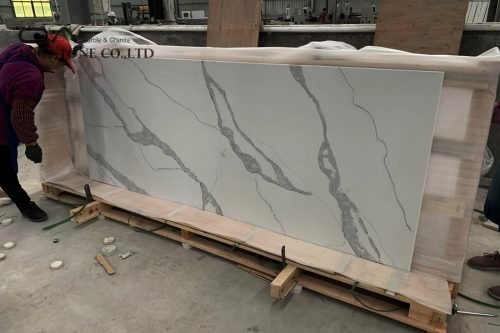
 The carrara gioia quartz countertops by daltile made of engineered quartz (not to be confused with Quartzite, another appealing natural stone used as counters) is a manmade product created mostly from natural materials. It’s made of 90% to 94% ground quartz and 6% to 10% resins and pigments that are combined into durable and nonporous slabs. The strength of quartz, even in a manufactured form, makes it naturally resistant to abrasion, scratches, dents, and even acids without the need for sealants. And the environmental impact of manufactured quartz is low: Quartz is an abundant material and the finished product is nontoxic and nonallergenic and will last a lifetime, reducing the need for replacement.
The carrara gioia quartz countertops by daltile made of engineered quartz (not to be confused with Quartzite, another appealing natural stone used as counters) is a manmade product created mostly from natural materials. It’s made of 90% to 94% ground quartz and 6% to 10% resins and pigments that are combined into durable and nonporous slabs. The strength of quartz, even in a manufactured form, makes it naturally resistant to abrasion, scratches, dents, and even acids without the need for sealants. And the environmental impact of manufactured quartz is low: Quartz is an abundant material and the finished product is nontoxic and nonallergenic and will last a lifetime, reducing the need for replacement. The sCarrera quartz countertops made of engineered quartz (not to be confused with Quartzite, another appealing natural stone used as counters) is a manmade product created mostly from natural materials. It’s made of 90% to 94% ground quartz and 6% to 10% resins and pigments that are combined into durable and nonporous slabs. The strength of quartz, even in a manufactured form, makes it naturally resistant to abrasion, scratches, dents, and even acids without the need for sealants. And the environmental impact of manufactured quartz is low: Quartz is an abundant material and the finished product is nontoxic and nonallergenic and will last a lifetime, reducing the need for replacement.
The sCarrera quartz countertops made of engineered quartz (not to be confused with Quartzite, another appealing natural stone used as counters) is a manmade product created mostly from natural materials. It’s made of 90% to 94% ground quartz and 6% to 10% resins and pigments that are combined into durable and nonporous slabs. The strength of quartz, even in a manufactured form, makes it naturally resistant to abrasion, scratches, dents, and even acids without the need for sealants. And the environmental impact of manufactured quartz is low: Quartz is an abundant material and the finished product is nontoxic and nonallergenic and will last a lifetime, reducing the need for replacement.





